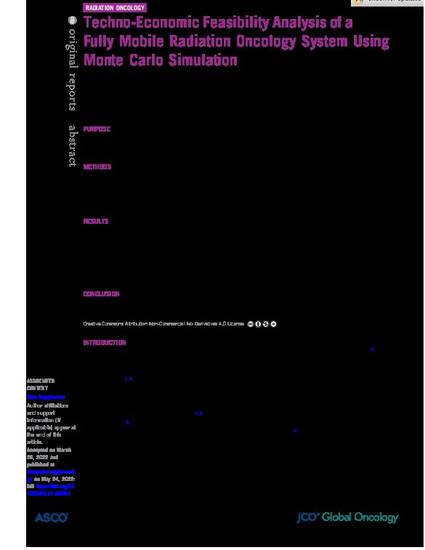
PURPOSEDisparities in radiation oncology (RO) can be attributed to geographic location, socioeconomic status, race, sex, and other societal factors. One potential solution is to implement a fully mobile (FM) RO system to bring radiotherapy to rural areas and reduce barriers to access. We use Monte Carlo simulation to quantify techno-economic feasibility with uncertainty, using two rural Missouri scenarios.METHODSRecently, a semimobile RO system has been developed by building an o-ring linear accelerator (linac) into a mobile coach that is used for temporary care, months at a time. Transitioning to a more FM-RO system, which changes location within a given day, presents technical challenges including logistics and quality assurance. This simulation includes cancer census in both northern and southeastern Missouri, multiple treatment locations within a given day, and associated expenditures and revenues. A subset of patients with lung, breast, and rectal diseases, treated with five fractions, was simulated in the FM-RO system.RESULTSThe FM-RO can perform all necessary quality assurance tests as suggested in national medical physics guidelines within 1.5 hours, thus demonstrating technological feasibility. In northern and southeastern Missouri, five-fraction simulations' net incomes were, in US dollars (USD), $1.55 ± 0.17 million (approximately 74 patients/year) and $3.65 USD ± 0.25 million (approximately 98 patients/year), respectively. The number of patients seen had the highest correlation with net income as well as the ability to break-even within the simulation. The model does not account for disruptions in care or other commonly used treatment paradigms, which may lead to differences in estimated economic return. Overall, the mobile system achieved a net benefit, even for the most negative simulation scenarios.CONCLUSIONOur simulations suggest technologic success and economic viability for a FM-RO system within rural Missouri and present an interesting solution to address other geographic disparities in access to radiotherapy.
Available at: http://works.bepress.com/casey-canfield/34/
